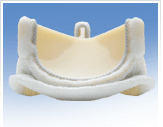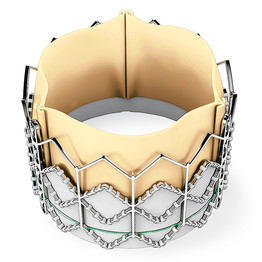“What Are My Options For Aortic Valve Replacement Re-Operations?” Asks Jon
By Adam Pick on March 6, 2012
I just received an interesting question from Jon about the durability of heart valve replacement devices. He writes, “Adam – I know that the bulk of your patient questions are in regard to upcoming surgeries. But, for those of us who have already had surgeries — like myself who had aortic valve replacement two years ago and I’m 60 years old now — what does my future look like? I was told that my bovine replacement would last 10, 15 or even 20 years. Will my future replacement be identical to the same surgery? Or, will I be looking at something else? Thanks, Jon”

Bovine Aortic Valve Replacement (Edwards Lifesciences)
While I have my thoughts on this topic, I wanted to provide Jon an expert opinion.
That said, I contacted Dr. Rawn Salenger, heart surgeon and Director of the Heart Valve Program at Good Samaritan Hospital in Suffern, New York.

Dr. Rawn Salenger
In his response, Dr. Salenger first addressed the extended durability of the newer tissue valves including bovine valves.
New generation bovine valves are lower profile and more durable than the valves we put in 20 years ago. Therefore, some tissue (bovine) valves can last more than 20 years in the aortic position. Older patients tend to get more years out of their tissue valves.
Then, Dr. Salenger commented on the possibilities for a potential re-operation should Jon’s valve deteriorate.
If Jon requires another aortic valve replacement there will likely be more options in the future. Valve companies are continuing to improve the performance and durability of their valves. In addition, there are an increasing number of approaches to delivering valves inside the heart. Right now, open chest surgery is still the “gold standard”. However, rapid progress is being made in delivering valves crimped inside catheters through an artery and into the heart (shown below). This can already be done and the technology is improving. When a personʼs arteries are too small for this procedure, the catheter can be placed via a small incision on the front of the chest, through the ascending aorta, and into the aortic valve position. Some of these techniques still need to be perfected but may be routine in the future.

Edwards SAPIEN Aortic Valve Replacement (Edwards Lifesciences)
So you know, Dr. Salenger’s clinical interest include post-operative care. In case you missed, here is a great interview with Dr. Salenger in which he addresses various patient factors impacting the durability of heart valve repair and heart valve replacement procedures.
Thanks to Jon for his excellent question and a special thanks to Dr. Salenger for sharing his clinical experience and research with our community.
Keep on tickin!
Adam
|
Lynda Knopf BS/RN says on March 7th, 2012 at 4:21 pm |
|
THANK YOU Dr.Salenger for presenting excellent advise regarding surgical heart valvular replacements or repair and emphasizing patient pertinance to seek a cardiothoracic surgeon who has reputable,finite expertise and technical skills for lasting good surgery outcome. Stressing patient compliance needs to have: adequate followup doctor and dental office visits,routine exercise for thirty minutes five days a week,echocardiogram testing every six to twelve months,good weight control and healthy nutrition is MOST INFORMATIVE! |
 |
|
Jim Hayden says on March 7th, 2012 at 5:50 pm |
|
Jon: You ask a good question. I had my aortic valve replaced in 2000 at the age of 60. I exercise regularly, eat all the right foods, take a statin, and all the right supplements, as well as an aspirin a day. I am in good health otherwise and visit my cardiologist twice per year. |
 |
|
Doris Taylor-Marcus says on March 8th, 2012 at 9:33 am |
|
Thank you for your very informative info about tissue Aortic Valve replacement. I have learned more from you and other physicians who paricipate in in Adams programs than from the surgeion who preformed my surgry and the Cardiologist. I am four months recovered and attend Cardiac Rehab 3 times a week and it has made me stronger. I am feeling better every day even at the age of 82. Doris |
 |
|
Jeanette says on March 8th, 2012 at 10:35 am |
|
Thank you! Just wondering, though..How can I slow down, or reverse, calcification in my aortic artery? I haven’t had surgery, but have changed my diet and stepped up my exercise. I’ve read that MK 7 (a particular form of vitamin K)can help get the calcium I take (I’m soon to be 59)into my bones and away from the arteries! I’d appreciate any light that can be shed on this subject~ |
 |
|
Nancy says on March 11th, 2012 at 6:03 pm |
|
Hi,Thanks for this website. It is so helpful. I am facing first surgery (age 57) and wondering what valve to pick and surgeon. I am curious about the comment of ethics of Edwards, please tell me more. I wish I could do mechanical, everyone wants me to do tissue valve. Coumadin is a problem with other health issues. I live in Twin Cities, MN, so if anyone has a name a great congenital heart surgeon and valve replacement experience, I would love to hear from you. |
 |
|
Dan says on March 14th, 2012 at 8:03 pm |
|
Nancy, I just completed (Mar 6, 2012) an aortic valve replacement at the Mayo Clinic, St. Mary’s Hospital, in Rochester, MN, with Dr. Kevin Greason as my primary surgeon. I opted for a bovine tissue valve because, at age 51, I worried about the long-term effects of coumadin or other blood thinners. Also, the newer bovine bioprostheses look to be a bit more robust, potentially offering me 20+ years of use before replacement. By that time, I rationalize, TAVI and other stent-type, non-invasive valve replacements may be more the norm. The entire surgical team, recovery team, nurses and support staff at St. Mary’s are outstanding. I highly recommend Dr. Greason, the Mayo Clinic, and St. Mary’s hospital for your procedure. Feel free to contact me with any questions. |
 |
|
Tony says on March 25th, 2012 at 9:57 am |
|
I too am 57 and facing AVR in two weeks. I still have not chosen what type of valve I want. I go back and forth. Can you hear mechanical valve noise at all? How will tissue valve be replaced in future? After heart cath my surgeon said all was clear and that he wold not expect to ever do anything to my heart agin after AVR. Should I pick mechanical valve so I never have to do this again? |
 |
|
Nancy says on March 25th, 2012 at 4:06 pm |
|
Thanks for all your suggestions. Tony I too see the surgeon this week and have to decide on a valve. I guess I am going with a tissue valve due to my other health issues but it is up to the surgeon. I don’t want to hear the noise of a mechanical and I am very bad at taking medication like coumadin, I know I will miss dosage. I don’t want to worry about blood clots or have routine blood checks. I hope I am making the right decision. It is a hard decision, I have weighed out pros and cons and there isn’t an easy answer. It depends on your health, lifestyle, what is the lesser worry for you. I am open to chatting more about it if you wish. Trust your gut and you will make the right decision for you. |
 |
|
Toni says on March 29th, 2012 at 5:12 pm |
|
By now perhaps your decisions have been reached, but if not, here is a bit of my husband’s experience. First AVR (at age 46) was a carbo-medic mechanical valve. Yes, you could hear it clicking, and yes it required coumadin. The sound really wasn’t troublesome, and actually became somewhat of a comforting sound. Replacement of that valve was with a medtronic-freestyle, porcine. No more coumadin, no more clicking. Both surgeries were done at Mayo, St. Mary’s. The surgeons in both instances were incredible (Dr. Sundt and Dr. Daley). The care teams were excellent as well. However, if you are indeed in the Twin Cities, it is our understanding that Regions Hospital is also impressive. Best of wishes to you. |
 |
|
Chris Vereb says on April 29th, 2016 at 5:39 pm |
|
Please contact me. I will be having surgery with Dr. Greason June 14th 2016 |
 |
|
Chris Vereb says on May 1st, 2016 at 7:14 am |
|
Hello. Dr. Greason will be my surgeon June 14th 2016. How are you doing as of 2016. Still not sure which way to go. I am 51. |
 |













